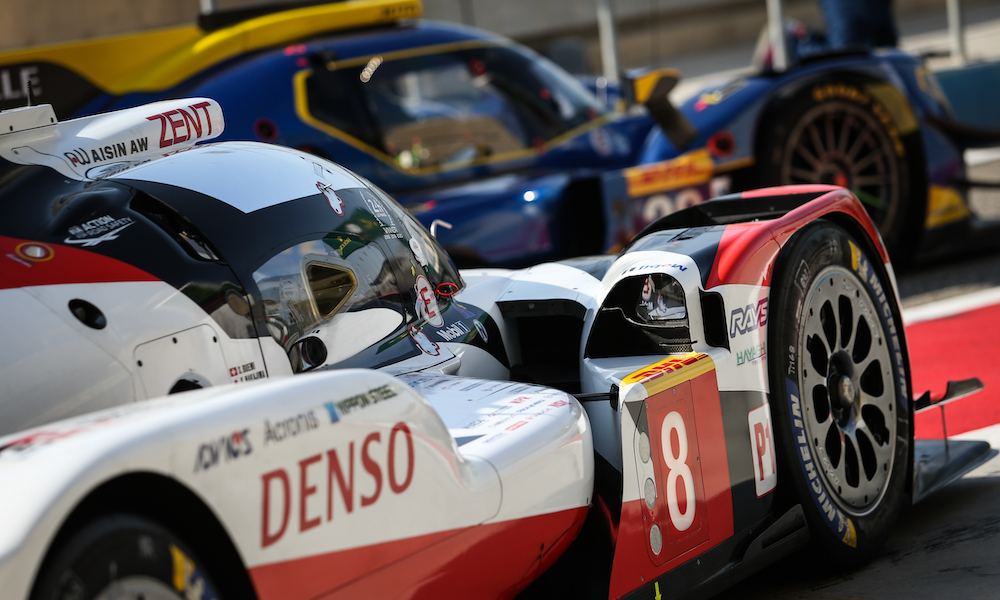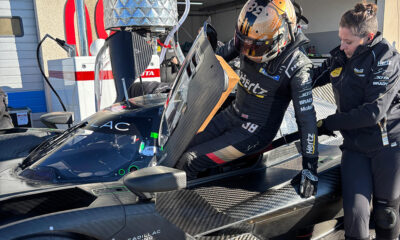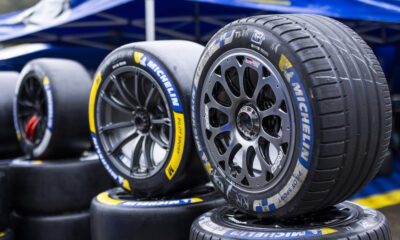
Photo: Toyota Gazoo Racing
JOTA LMP2 driver Anthony Davidson says the speeding up of the Toyota TS050 Hybrids for this weekend’s FIA World Endurance Championship finale has made “a huge difference” and removed “many awkward situations” with the LMP1 cars in traffic.
The success handicap system designed to create a lasting title battle in LMP1 greatly curbed the Toyotas’ performance after their winning start to the 2019-20 campaign.
However, with the Japanese manufacturer facing no non-hybrid competition at the 8 Hours of Bahrain, the other LMP1 cars were taken out of the handicap calculations.
With the size of each handicap dependent on the gaps between cars in the championship table, removing the non-hybrids enabled the No. 7 Toyota to be considered the last-placed ‘reference car’ which reduced its handicap amount to zero seconds per lap.
After a trio of Free Practice sessions, Davidson told Sportscar365 that he noticed the Toyotas passing his Oreca 07 Gibson much easier compared to last year.
In the 2019 Bahrain WEC race the Toyotas were handicapped by 2.51 and 2.72 seconds per lap and given a minimum weight of 932 kg, while this weekend they are 54 kg lighter and also have various breaks in their fuel and energy allowances.
“I did notice that they were much quicker here this time around than they were last December,” said Davidson, who drove for Toyota between 2012 and 2017.
“It has made a huge difference. It seems like they’ve got more boost now. They were blasting past us in practice and, honestly, it’s easier.
“They pass you and they’ve come and gone. It now feels like the car that I remember driving.”
Davidson described how last year the Toyotas were handicapped so heavily that their pace and the pace of the LMP2 runners were overlapping at several parts of the track.
“You could see they were struggling, and we were all getting annoyed with each other,” he said.
“We would re-pass them down the straight and they would boost past on the corner only just, and then they’d have a fuel cut.
“At some parts of the lap they would be significantly fast enough that they could brake clear of you, but if you were in a situation where you had new tires and they were on old tires, they were in your way.
“It didn’t feel right. We’ve got the capacity as professional drivers to cope with it, but it was a bit of a problem for the Am drivers out there and the GT drivers at times.
“It does feel a bit safer and it makes much more sense. From our point of view, I’m glad it’s gone back to where it was [in past seasons].”
Toyota’s drivers have also voiced support for the success handicap calculation change, which was put forward by the team to the WEC.
“[It is] much easier with the GTs and LMP2s because we are much quicker than them,” said Sebastien Buemi, driver of the No. 8 car with Kazuki Nakajima and Brendon Hartley.
“We’ll be back with proper speed and the way the car was designed to work in. That’s quite cool for a driver, to be able to drive in the right conditions.”
Hartley added that the Toyota package for Bahrain is “more enjoyable” to drive with the adjusted technical parameters.
“Even at full potential, they’re always quite limited on the amount of energy we’re allowed to use, but it’s nice that we get to finish this LMP1 era when the cars are almost back to full potential,” he told Sportscar365.
“They deserve to have a nice sign-off in that respect. It’s also good for the racing, particularly for the LMP2 cars whose top speeds were getting close to us and were sometimes quicker.”
The change is also benefiting the GTE competitors that were also closing in on the Toyotas during last year’s Bahrain event.
“The problem was that they had to recharge too much last year, but it’s better now,” said Aston Martin Racing GTE-Pro ace Nicki Thiim. “It’s always better the faster they go.”
Across the three practice sessions this weekend, the fastest Toyota lap was a 1:42.857 while in 2019 the best time over the same set of sessions was a 1:44.221.
When asked by Sportscar365, Toyota WEC technical director Pascal Vasselon said he expects the cars to be as quick as 1:39 in qualifying, compared to 1:42.9 last year.


























